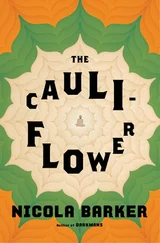Melissa sat on the tube feeling irritated and depressed. It wasn’t just that she had upset John — an artist, a sculptor, someone who made things change, someone who was inspired — it was also that she couldn’t make him understand what she meant. He had mistaken how she was, what she wanted to say, and had twisted it, had made it seem senseless. That wasn’t what she’d wanted at all, not what she’d intended. In her heart she respected John for his determination and purposefulness, and she envied him. She even liked his ideas. But she wanted to see each situation from every angle, to uncover every mystery and to analyse it, to understand things completely. She wanted to be able to appreciate everything, the totality of things. She sat on the tube and thought, ‘Maybe I only want total understanding because there is something wrong with me. Maybe it’s like Steve says, that I think about things too hard, feel things as a kind of excuse for doing nothing. I wonder if that is what Steve says …’ She couldn’t clearly remember.
At work on Monday Steve questioned Melissa closely about her weekend. She seemed deflated, depleted. First thing in the morning he made her tea and said, ‘You seem depressed again. Any particular reason?’
Melissa thanked him as she took the proffered mug. ‘Yes … No. I saw John, you know, on Saturday. We had a bit of a row. I think I offended him, but in a way I think he was being a bit pig-headed and stupid.’
Steve frowned. ‘How did it happen?’
She paused and looked down for a moment, unsure whether she wanted to discuss it with him. She felt very protective of John, possessive. Eventually she said, ‘If you laugh I’ll be furious. What he’s doing isn’t funny, it’s just that I’m not sure if I think it’s a good idea.’
Steve interrupted. ‘Don’t analyse in advance before you’ve even told me what this is all about. It doesn’t mean anything to the uninitiated. Tell me.’
She sighed. ‘Well, he’s making this stupid coffin which is based on some stupid Warhol painting, the Campbell’s soup can thing, you know.’
‘Vaguely. You mean he’s making a coffin which looks like one of the old Campbell’s soup cans?’
He tried not to smile, but she saw his expression and said angrily, ‘I knew I couldn’t trust you. I knew you’d just try and trivialize this.’
Steve looked indignant. ‘I’m not trivializing anything. I happen to think that it’s an excellent idea, and funny — not funny-stupid — I mean a good idea.’
Melissa looked away sulkily. He sighed. ‘For God’s sake, Melissa, what’s the big deal? Since when does it matter a jot what you think about his work? Your ideas are your business.’
She turned back to face him but couldn’t think of how to reply. Eventually she said, ‘I don’t even know. Maybe I’m just jealous or something.’
Steve smiled incredulously, ‘Of what, for fuck’s sake?’
She shrugged, ‘Of anything, everything. What do I know?’
He shook his head, amazed. ‘Not of anything, Melissa, of nothing. You’re not jealous of anything, it’s just a stupid impulse that you’ve had, a pointless display that means nothing. Maybe you do have a reason, but I can’t think what it is. Maybe you’re just contrary by nature.’
Someone came into the shop and Steve walked over to help them. Melissa regretted having talked to him at all. She felt stupid.
John awoke early on Sunday morning. It was still dark outside. When he tried to move his body it felt weak and stiff. His mouth was dry and he felt as though his throat was sealed and his lungs were somehow deflated. He struggled to breathe. The atmosphere in the room was very dusty. After a great deal of concentration and self-persuasion he managed to drag himself from the sofa and on to the floor. His body felt as fluid as water, as devoid of energy. He thought, ‘But water is very powerful and I am just one person, a single person whose body is no longer working.’ He didn’t even really understand what was wrong with it.
He dragged himself along the floor, into the hallway and slowly, inch by inch, upstairs. He crawled into his bedroom and on to the bed. By the time he was on the bed the sun had begun to rise. He felt too tired and lethargic to close his curtains, so closed his eyes instead and drew a sheet over his body and face. The colour inside his head was a red-orange; the colour of the light shining in through the skin, blood and veins of his eyelids.
He felt sad and resentful, languid. He tried not to think of Melissa but she was all he could think of. It was as though she had violated his great plan, his scheme, his purpose. She had made it into something without meaning, or rather, something too full of the wrong sort of meaning. At the back of his mind he knew that Melissa had merely been facetious and that what she’d said should hardly make any difference. He knew that a small display of conventional disapproval shouldn’t be capable of affecting his purpose and his belief in what he was doing, that in many ways it should rather have reaffirmed the purity of his ambitions, the greatness and originality of his work.
At the back of his head was a sneaking awareness that his sudden depression and disillusionment were nothing to do with his work, his ambition, his aims. In actuality it was to do with the fact that he was dying, and his body was slowing down, perceptibly slowing down. He didn’t want to think about it so he tried to think about other things as he lay on his bed almost too weak for comprehensive thought, but not quite.
He lay in bed for a full twenty-four hours and then got up, stumbled downstairs and had three glasses of water before recommencing work.
Melissa spent the following ten days debating whether to send John a card or a postcard saying sorry. In some ways though she thought it was best just to ignore what had happened on her previous visit and simply to visit again and pretend nothing had gone wrong, or maybe to start off by saying sorry. She decided that it was best to just let things cool off. She was relatively nonchalant and saw the scale of their relationship in terms of the infinite. She saw no reason why they shouldn’t be good friends in the future if she gave things time.
Steve said nothing to her, but he was convinced that she was in love. In fact she was not in love at all, she was just bored and had nothing else to think about. A general sense of apathy gave specific things in her life more emphasis. Even so, she thought a lot, and often her thoughts were on John.
John carried on working. It was difficult because his body was no longer dutiful. Often it moved in ways which were of no use to his work at all. It had become a hindrance. But he made progress. After ten days he had completed his coffin’s lid. The shape was perfect and he filed it so that it was as smooth as the flesh on his belly.
The following few days he spent in a state of half-wakefulness; sleeping on the sofa and only rising to open some tins of beans or spaghetti or soup which he ate cold, or to drink glasses of water. He listened to the radio for company.
Among the letters on his doormat was one from his mother, who was concerned because she had not heard from him and his telephone number was unobtainable. There was also a letter from his old girlfriend which said that she was thinking of coming home to England for good. Things hadn’t worked out and she needed his advice. John read neither letter. Instead he dreamed of his silver spray can and his pot of varnish. He was nervous about doing the lettering because his hands were now so weak.
Eventually he felt strong enough to work again. He had a wash and opened a window for ventilation as it advised on the spray cans he was using. He worked slowly but with infinite care. When he looked at the coffin he felt so proud that a lump came into his throat. It was shaped perfectly in every detail. At either end the edges of the coffin jutted out slightly as they do in that place on tin cans where you fix the tin opener and squeeze. He had sanded a series of rings on the top and bottom of the coffin that radiated into a central circle like those on a real tin. He had even created a seam down the edges, a little exaggeration on one side, where his actual seam was. On the other side the join was virtually invisible. The tin was entirely coherent and faultless. To stop his coffin rolling about like a normal tin does when it is on its side, he had filed a very small part of the base of the coffin flat, but this was hardly visible and didn’t really affect the tin’s radius. He had also made four neat wooden triangles which acted on the same principle as door-stops. If he pressed two in firmly on each side of the coffin they supported it and curtailed any possibility of it rolling. (These he didn’t spray silver.)
Читать дальше
Конец ознакомительного отрывка
Купить книгу












